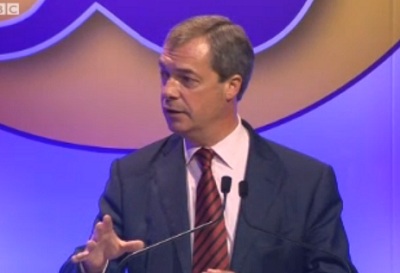Is UKIP here to stay as a serious player?

Have they been given the space to emerge onto the main stage?
Being taken seriously is the first and probably the biggest challenge for any group or individual outside the mainstream seeking to break in. Politics, like so much of society, has institutional inertia and it takes a lot to disrupt the virtuous circles keeping the main parties in place and the rest out. Put simply, without support, you don’t get any attention or credibility; without credibility and attention, you don’t gain any support.
Was Nigel Farage right to be so confident in his address to his party’s conference? Perhaps so. The media inertia means that most of the focus remains on the three main UK parties: the declines in vote share suffered by the Lib Dems shortly after taking office and the Tories more recently, and the increase in Labour’s share. The increase in UKIP’s share has been off the radar. It shouldn’t be.
-
There was a foretaste of their potential success in the 2009 European Parliamentary elections when they finished second, ahead of both Labour and the Lib Dems, never mind the Greens or BNP, with whom they’re more commonly bracketed.
That, however, was written off as exceptional as the election was in the middle of the expenses scandal, voters don’t take the EP seriously, and the election was the one that played to UKIP’s strength. The 2010 election was seen as returning to business as normal, though at more than 3% they still won not far off a million votes.
Since then, they’ve had two windfalls drop into their lap. The Conservatives entering government meant that some centre-right voters would inevitably be disillusioned by actions taken (or not taken), and find UKIP to be a suitable protest vehicle. Going by the September 19 YouGov poll, for example, one in ten Tory voters from 2010 would now vote UKIP; double the leakage that there’s been from Blue to Red. They’ve also benefited to a lesser extent from the fracturing of the Lib Dems’ share, which always had an element of ‘not the others’ within it. Perhaps significantly, their vote is concentrated in those groups most likely to turn out.
Indeed, the picture may be even rosier for UKIP than many of the polls suggest. The institutional inertia means that some companies still hide UKIP away in ‘Others’ even though they contested by far the majority of seats. When offered as an option on an equal footing, as the pollster Survation does, the vote share unsurprisingly increases.
Perhaps one factor above all others will determine whether UKIP can make that breakthrough in 2015: whether Farage has a place in the leaders’ debates, assuming they take place. Not being there will implicitly and practically consign him and his party to obscurity; taking part will give him coverage massively beyond anything they’ve had before and put him on at least a near-equal footing with Cameron, Miliband and whoever leads the Lib Dems at the time.
Like other aspects of institutional inertia, the easiest thing for the TV companies would be to invite just the big three. The SNP tried to challenge that last time but didn’t get very far, perhaps not least because their leader wasn’t even standing for parliament and they were contesting less than 10% of the seats – though their fear as to the effect their exclusion would have may well have been realised.
If UKIP can poll at least as well as the Lib Dems in the run-up to the general election – entirely plausible given where things stand now and the likely boost they’ll receive from the 2014 European elections – they’ll have a much stronger case than the SNP did, despite their previously dismal record in winning seats.
Such chances to make a breakthrough come at best once in a generation. After the election, it’s highly likely that at least one of the Lib Dems and Conservatives will be back in opposition, and perhaps both. Either out of office will erode UKIP’s support. Which is why if the Purples are to break into the mainstream, they have 30 months in which to do it.